
Social Aspects of Cooperating Objects Technologies
International Workshop
November 1-2, 2006 | Technical University Berlin
Speakers
 Somaya
Ben Allouch is a PhD candidate at the New Media and Communication
group at the University of Twente, the Netherlands. Her research focuses
on the design and use of (new) media and ICT. In her PhD project she looks
specifically at the design and use of ambient intelligent applications.
>
Homepage at University of Twente.
Somaya
Ben Allouch is a PhD candidate at the New Media and Communication
group at the University of Twente, the Netherlands. Her research focuses
on the design and use of (new) media and ICT. In her PhD project she looks
specifically at the design and use of ambient intelligent applications.
>
Homepage at University of Twente.
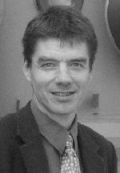 Michael
Decker, PD Dr rer. nat., studied physics (minor subject economics)
at the university of Heidelberg, 1992 diploma, 1995 doctorate with a dissertation
on temperature measurements in high pressure combustion by laser-techniques
at the university of Heidelberg, 1995-1997 scientist at the German Aerospace
Center (DLR) in Stuttgart, 1997-2002 member of the scientific staff of
the Europäische Akademie GmbH. He was manager of the project "Robotics.
Options of the replaceability of human beings" and the study group
"Miniaturization and Material Properties". He coordinated the
EU-Project TAMI (Technology Assessment in Europe. Between Method and Impact).
Since 2003 he is member of the scientific staff and since February 2004
vice-director of the Institute for Technology Assessment and System Analysis
(ITAS) at the Research Centre Karlsruhe, 2006 habilitation at the faculty
of applied sciences of the university of Freiburg with a study on interdisciplinary
research for technology assessment. He chairs the coordination team of
the German-speaking Network Technology Assessment. Main research areas:
TA of robotics, pervasive computing and nanotechnology, comparison of
TA-methods and interdisciplinary research for policy advice. >
Homepage at ITAS.
Michael
Decker, PD Dr rer. nat., studied physics (minor subject economics)
at the university of Heidelberg, 1992 diploma, 1995 doctorate with a dissertation
on temperature measurements in high pressure combustion by laser-techniques
at the university of Heidelberg, 1995-1997 scientist at the German Aerospace
Center (DLR) in Stuttgart, 1997-2002 member of the scientific staff of
the Europäische Akademie GmbH. He was manager of the project "Robotics.
Options of the replaceability of human beings" and the study group
"Miniaturization and Material Properties". He coordinated the
EU-Project TAMI (Technology Assessment in Europe. Between Method and Impact).
Since 2003 he is member of the scientific staff and since February 2004
vice-director of the Institute for Technology Assessment and System Analysis
(ITAS) at the Research Centre Karlsruhe, 2006 habilitation at the faculty
of applied sciences of the university of Freiburg with a study on interdisciplinary
research for technology assessment. He chairs the coordination team of
the German-speaking Network Technology Assessment. Main research areas:
TA of robotics, pervasive computing and nanotechnology, comparison of
TA-methods and interdisciplinary research for policy advice. >
Homepage at ITAS.
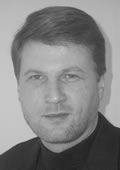 Stephan
J. Engberg is member of the Strategic Advisory Board of the EU ICT
Security & Dependability Taskforce and as such involved in roadmapping
and writting the Recommendations Report. He is founder of Priway and the
spin-off company RFIDsec based on a private research project "Privacy
Highway" focussing on ways to reconcile the security requirements in both
ambient and integrated digital networks. Priway is partner in a IST IP
project HYDRA on Networked Embedded Systems and has been involved in EU
Security and Identity Roadmapping since pre-FP6 and a range of workshops
and conferences such as Trust in the Net, SWAMI, Public Services Summit,
NATO Advanced Research Workshop and the upcomming EU-US Cybertrust Workshop
on System Dependability & Security. Engberg holds an M.Sc. in Business
Adminstration and Computer Science at Copenhagen Business School together
with studying International Strategy at Londong Business School. He has
been lecturing at Copenhagen Business School and the IT University for
a number of years on Trust Socio/Economics and Context Security especially
in mobile environments. He is dedicated to the work of designing Empowerment
& Dependability into ICT systems for the purpose of balanced trustworthiness.
> Priway - Security
in Context.
Stephan
J. Engberg is member of the Strategic Advisory Board of the EU ICT
Security & Dependability Taskforce and as such involved in roadmapping
and writting the Recommendations Report. He is founder of Priway and the
spin-off company RFIDsec based on a private research project "Privacy
Highway" focussing on ways to reconcile the security requirements in both
ambient and integrated digital networks. Priway is partner in a IST IP
project HYDRA on Networked Embedded Systems and has been involved in EU
Security and Identity Roadmapping since pre-FP6 and a range of workshops
and conferences such as Trust in the Net, SWAMI, Public Services Summit,
NATO Advanced Research Workshop and the upcomming EU-US Cybertrust Workshop
on System Dependability & Security. Engberg holds an M.Sc. in Business
Adminstration and Computer Science at Copenhagen Business School together
with studying International Strategy at Londong Business School. He has
been lecturing at Copenhagen Business School and the IT University for
a number of years on Trust Socio/Economics and Context Security especially
in mobile environments. He is dedicated to the work of designing Empowerment
& Dependability into ICT systems for the purpose of balanced trustworthiness.
> Priway - Security
in Context.
Ernst Andreas Hartmann, Prof. Dr., Head of Socio-Economic Section VDI/VDE Innovation + Technik GmbH. > VDI/VDE Innovation + Technik GmbH.
Leon Hempel, Dr., Centre for Technology and Society, Technical University Berlin.
 Mireille
Hildebrandt, Dr., teaches law and legal theory at Erasmus University
Rotterdam. In 2002 she wrote her PhD thesis in the field of criminal procedure
and legal philosophy, with special focus on issues of epistemology. From
2002 she has been seconded as senior researcher to the institute of Law
Science Technology and Society at the Vrije Universiteit Brussel to participate
in a multidisciplinary research project on the relationship between law,
technology and democracy, supervised by Serge Gutwirth, Bruno Latour and
Isabelle Stengers. She is involved in the European Network of Excellence
on the Future of Identity in Information Society (FIDIS) as a coordinator
for the subject of profiling technologies. From 2003-2006 she also taught
comparative legal traditions of the world in the LLM Program on International
Legal Cooperation at the Vrije Universiteit Brussel. >
Homepage at Free University Brussels.
Mireille
Hildebrandt, Dr., teaches law and legal theory at Erasmus University
Rotterdam. In 2002 she wrote her PhD thesis in the field of criminal procedure
and legal philosophy, with special focus on issues of epistemology. From
2002 she has been seconded as senior researcher to the institute of Law
Science Technology and Society at the Vrije Universiteit Brussel to participate
in a multidisciplinary research project on the relationship between law,
technology and democracy, supervised by Serge Gutwirth, Bruno Latour and
Isabelle Stengers. She is involved in the European Network of Excellence
on the Future of Identity in Information Society (FIDIS) as a coordinator
for the subject of profiling technologies. From 2003-2006 she also taught
comparative legal traditions of the world in the LLM Program on International
Legal Cooperation at the Vrije Universiteit Brussel. >
Homepage at Free University Brussels.
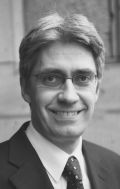 Lorenz
Hilty, Prof. Dr. rer. nat., head of the Technology and Society Lab
at the Swiss Federal Laboratories for Materials Testing and Research (Empa)
and lecturer at the University of St.Gallen (HSG), studied Computer Science
and Psychology at Hamburg University and received his Ph. D. in 1991.
In 1998, he became a professor for Information Systems at the University
of Applied Sciences Northwestern Switzerland. In 2000, he initiated the
research program "Sustainability in the Information Society"
(SIS) at Empa, co-funded by the ETH board (2001-2005), from which the
Technology and Society Lab emerged in 2004. Lorenz Hilty is the vice chair
of the Technical Committee "Computers and Society" of the International
Federation for Information Processing (IFIP TC 9) and member of the board
of the Swiss Informatics Society (SI). He is the author of many influential
publications in the field of environmental and social impacts of ICT,
including the study "The Precautionary Principle in the Information
Society", commissioned by the Swiss Center for Technology Assessment
(TA-SWISS). >
Homepage at EMPA.
Lorenz
Hilty, Prof. Dr. rer. nat., head of the Technology and Society Lab
at the Swiss Federal Laboratories for Materials Testing and Research (Empa)
and lecturer at the University of St.Gallen (HSG), studied Computer Science
and Psychology at Hamburg University and received his Ph. D. in 1991.
In 1998, he became a professor for Information Systems at the University
of Applied Sciences Northwestern Switzerland. In 2000, he initiated the
research program "Sustainability in the Information Society"
(SIS) at Empa, co-funded by the ETH board (2001-2005), from which the
Technology and Society Lab emerged in 2004. Lorenz Hilty is the vice chair
of the Technical Committee "Computers and Society" of the International
Federation for Information Processing (IFIP TC 9) and member of the board
of the Swiss Informatics Society (SI). He is the author of many influential
publications in the field of environmental and social impacts of ICT,
including the study "The Precautionary Principle in the Information
Society", commissioned by the Swiss Center for Technology Assessment
(TA-SWISS). >
Homepage at EMPA.
Matt Jones, Dr., has recently moved from New Zealand to Wales where he is helping to set up the Future Interaction Technology Lab at Swansea University. He has worked on mobile interaction issues for the past ten years and has published a large number of articles in this area. He is the co-author (with Gary Marsden) of Mobile Interaction Design (John Wiley & Sons, 2006). He has had many collaborations and interactions with handset and service developers including Microsoft Research, Orange, Reuters, BT Cellnet, Nokia and Adaptive Info; and has one mobile patent pending. He is an editor of the "International Journal of Personal and Ubiquitous Computing" and on the steering committee for the "Mobile Human Computer Interaction" conference series.
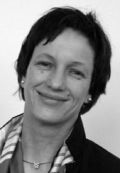 Dorothea
Kübler, Prof. Dr., is Chair in Microeconomics at the Faculty
of Economics and Management of the Technical University Berlin. She studied
Economics at the University of Konstanz and the Free University Berlin,
and finished her PhD thesis at the Humboldt University Berlin in 1997.
After fellowships and research visits in Berkeley, Bergen and Harvard
she became Assistant at the Institute for Economic Theory of the Humboldt
University Berlin where she submitted her habilitation in 2003. Her main
research interests are game theory, information economics, and psychology
and economics. She is currently leading the research project "Strategic
uncertainty in experimental games" funded by the German Science Foundation
DFG. >
Homepage at TUB.
Dorothea
Kübler, Prof. Dr., is Chair in Microeconomics at the Faculty
of Economics and Management of the Technical University Berlin. She studied
Economics at the University of Konstanz and the Free University Berlin,
and finished her PhD thesis at the Humboldt University Berlin in 1997.
After fellowships and research visits in Berkeley, Bergen and Harvard
she became Assistant at the Institute for Economic Theory of the Humboldt
University Berlin where she submitted her habilitation in 2003. Her main
research interests are game theory, information economics, and psychology
and economics. She is currently leading the research project "Strategic
uncertainty in experimental games" funded by the German Science Foundation
DFG. >
Homepage at TUB.
 Albert
Kündig, Prof. em. Dr., received MS degrees from Swiss Federal
Institute of Technology ETH Zurich (Electrical Engineering) and Harvard
University (Applied Physics) in 1961 and 1964 resp., and a PhD from ETH
in 1974. At the former Swiss PTT research lab, he participated in an effort
to build one of the first experimental digital switching systems. From
1972 to 1983, he took gradually more responsibilities in the Swiss PTT
research division. Kündig joined the ETH Department of Information
Technology and Electrical Engineering as Professor for Systems Engineering
in 1983. His research interests centered on multimedia communication in
high performance networks, and design and development methodology for
real-time highly dependable systems. Albert Kündig retired from ETH
in 2002, however continuing with research in the history of technology
and studies regarding the impact of information technology on society,
economy and culture. His association with the Technology Assessment board
of the Swiss Council for Science and Technology reflects his keen interest
in this field. >
Homepage at ETH.
Albert
Kündig, Prof. em. Dr., received MS degrees from Swiss Federal
Institute of Technology ETH Zurich (Electrical Engineering) and Harvard
University (Applied Physics) in 1961 and 1964 resp., and a PhD from ETH
in 1974. At the former Swiss PTT research lab, he participated in an effort
to build one of the first experimental digital switching systems. From
1972 to 1983, he took gradually more responsibilities in the Swiss PTT
research division. Kündig joined the ETH Department of Information
Technology and Electrical Engineering as Professor for Systems Engineering
in 1983. His research interests centered on multimedia communication in
high performance networks, and design and development methodology for
real-time highly dependable systems. Albert Kündig retired from ETH
in 2002, however continuing with research in the history of technology
and studies regarding the impact of information technology on society,
economy and culture. His association with the Technology Assessment board
of the Swiss Council for Science and Technology reflects his keen interest
in this field. >
Homepage at ETH.
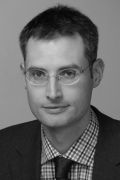 Ralf
Lindner, Dr., joined the Fraunhofer Institute for Systems and Innovation
Research (ISI) as a project manager and senior scientist at the department
of Emerging Technologies in 2005. He received his degree in political
science and economics from the University of Augsburg, completed graduate
work at the University of British Columbia (Vancouver) and post-graduate
studies at Carleton University (Ottawa). His doctoral dissertation, which
he completed at the department of political science at the University
of Augsburg, focuses on the application and integration of digital networks
in the communication strategies of intermediary organisations in North
America. He is particularly interested in the diffusion processes of ICTs,
emerging and future trends of media convergence and ubiquitous networks.
Additional research interests include cognitive policy analysis, epistemic
communities and processes of policy learning. Among his projects at the
Institute are SWAMI (Safeguards in a World of AMbient Intelligence) and
FAZIT (Foresight for future media and ICT sector trends). >
Homepage at ISI.
Ralf
Lindner, Dr., joined the Fraunhofer Institute for Systems and Innovation
Research (ISI) as a project manager and senior scientist at the department
of Emerging Technologies in 2005. He received his degree in political
science and economics from the University of Augsburg, completed graduate
work at the University of British Columbia (Vancouver) and post-graduate
studies at Carleton University (Ottawa). His doctoral dissertation, which
he completed at the department of political science at the University
of Augsburg, focuses on the application and integration of digital networks
in the communication strategies of intermediary organisations in North
America. He is particularly interested in the diffusion processes of ICTs,
emerging and future trends of media convergence and ubiquitous networks.
Additional research interests include cognitive policy analysis, epistemic
communities and processes of policy learning. Among his projects at the
Institute are SWAMI (Safeguards in a World of AMbient Intelligence) and
FAZIT (Foresight for future media and ICT sector trends). >
Homepage at ISI.
 Martin
Meints, Dr., studied chemistry and computer science at the University
Kiel. He worked in various enterprises and public organisations as IT
project manager and in technical management functions. Main focus of his
latest work was preparation and implementation of security concepts for
large private networks (LAN and WAN) and integrated mobile computing solutions
basing on the methodology of the Baseline Protection Manual from BSI,
the German Federal Office for Information Security. Since 2004 researcher
for the Independent Centre for Privacy Protection Schleswig-Holstein (ICPP);
he is mainly involved in the project "FIDIS - Future of Identity
in the Information Society". >
Independent Center for Privacy Protection Schleswig Holstein.
Martin
Meints, Dr., studied chemistry and computer science at the University
Kiel. He worked in various enterprises and public organisations as IT
project manager and in technical management functions. Main focus of his
latest work was preparation and implementation of security concepts for
large private networks (LAN and WAN) and integrated mobile computing solutions
basing on the methodology of the Baseline Protection Manual from BSI,
the German Federal Office for Information Security. Since 2004 researcher
for the Independent Centre for Privacy Protection Schleswig-Holstein (ICPP);
he is mainly involved in the project "FIDIS - Future of Identity
in the Information Society". >
Independent Center for Privacy Protection Schleswig Holstein.
 Marcelo
Pias, Dr., has been a Research Associate in the Computer Laboratory
at the University of Cambridge (UCL) since Sept. 2004. In his prior post
doctoral position at Intel Research Laboratories Cambridge, he worked
on decentralised P2P systems and wireless sensor networks. He obtained
a BEng in Computer Engineering from FURG (Brazil) in 1999 and a PhD degree
in Computer Science from UCL in February 2004. He is involved in two wireless
sensor projects: SESAME - SEnsing for Sport And Managed Exercise is a
UK EPSRC project that aims at tracking the performance of athletes in
sports events, and the EU funded Embedded WiSeNts project is preparing
a research roadmap in the area of wireless sensor systems for the EC.
> Homepage
at UCL.
Marcelo
Pias, Dr., has been a Research Associate in the Computer Laboratory
at the University of Cambridge (UCL) since Sept. 2004. In his prior post
doctoral position at Intel Research Laboratories Cambridge, he worked
on decentralised P2P systems and wireless sensor networks. He obtained
a BEng in Computer Engineering from FURG (Brazil) in 1999 and a PhD degree
in Computer Science from UCL in February 2004. He is involved in two wireless
sensor projects: SESAME - SEnsing for Sport And Managed Exercise is a
UK EPSRC project that aims at tracking the performance of athletes in
sports events, and the EU funded Embedded WiSeNts project is preparing
a research roadmap in the area of wireless sensor systems for the EC.
> Homepage
at UCL.
 Dan
Shapiro is Professor of Sociology at Lancaster University in the United
Kingdom. He is co-author of five books and many papers. He has a longstanding
track record of research in the ethnographic study of social practice
to inform the design of information systems, in participatory design and
evaluation with end users, and in interdisciplinary theory for information
system design and spatial computing. He has been a principal researcher
on a succession of EU funded projects since 1995 on computer-supported
cooperative work, collaborative working environments, spatial computing,
and ambient computing. >
Homepage at Lancaster University.
Dan
Shapiro is Professor of Sociology at Lancaster University in the United
Kingdom. He is co-author of five books and many papers. He has a longstanding
track record of research in the ethnographic study of social practice
to inform the design of information systems, in participatory design and
evaluation with end users, and in interdisciplinary theory for information
system design and spatial computing. He has been a principal researcher
on a succession of EU funded projects since 1995 on computer-supported
cooperative work, collaborative working environments, spatial computing,
and ambient computing. >
Homepage at Lancaster University.
 Werner
Rammert, Prof. Dr., is Speaker of the Center for Technology and Society
and Full Professor for Technology Studies at the Institute for Sociology
of the Technical University Berlin (TUB). >
Homepage at TUB.
Werner
Rammert, Prof. Dr., is Speaker of the Center for Technology and Society
and Full Professor for Technology Studies at the Institute for Sociology
of the Technical University Berlin (TUB). >
Homepage at TUB.
 Johannes
Weyer, Prof. Dr., is professor for Sociology of Technology at the
Department for Economics and Social Science of the University Dortmund.
He studied at the University Marburg and made his doctorate in 1983 with
a dissertation on the history of German sociology after 1945. From 1984
to 1999 he was assistant professor at the University of Bielefeld in the
field of science and technology studies. In 1991 he completed his habilitation
with a study on space policy in Germany from 1945 to 1965. After three
years in a consultant firm for e-logistics he was appointed professor
in Dortmund in 2002. His main research interests are: social shaping of
technology, technology policy, network analysis, and innovation management
in highly automated systems, especially in the field of transportation
and aerospace. He also has written a biography of the German space pioneer
Wernher von Braun. >
Homepage at University Dortmund.
Johannes
Weyer, Prof. Dr., is professor for Sociology of Technology at the
Department for Economics and Social Science of the University Dortmund.
He studied at the University Marburg and made his doctorate in 1983 with
a dissertation on the history of German sociology after 1945. From 1984
to 1999 he was assistant professor at the University of Bielefeld in the
field of science and technology studies. In 1991 he completed his habilitation
with a study on space policy in Germany from 1945 to 1965. After three
years in a consultant firm for e-logistics he was appointed professor
in Dortmund in 2002. His main research interests are: social shaping of
technology, technology policy, network analysis, and innovation management
in highly automated systems, especially in the field of transportation
and aerospace. He also has written a biography of the German space pioneer
Wernher von Braun. >
Homepage at University Dortmund.
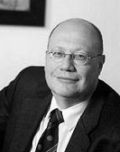 Adam
Wolisz, Prof. Dr., (Diploma in engineering, 1972, Doctoral Degree,
1976, Habilitation 1983 - Silesian University of Technology, Gliwice)
works since 1980 on computer networks and distributed systems. He has
been with Polish Academy of Sciences (until 1990), and later with the
Research Institute GMD-Fokus in Berlin (1990-1993). Since 1993 he has
joined the Technische Universitšt Berlin (TUB) where he is chaired Professor
for Telecommunication Networks and since 2001 Executive Director of the
Institute for Telecommunication Systems. He has served as the Dean of
the Faculty of Electrical Engineering and Computer Science in the period
2001- 2003. Since Summer 2005 he is also Adjunct Professor at the Dept.
EE&CS, University of California, Berkeley. His research interests are
in architectures and protocols of communication networks. Recently he
is focusing mainly on wireless/mobile networking and sensor networks.
>
Homepage at TUB.
Adam
Wolisz, Prof. Dr., (Diploma in engineering, 1972, Doctoral Degree,
1976, Habilitation 1983 - Silesian University of Technology, Gliwice)
works since 1980 on computer networks and distributed systems. He has
been with Polish Academy of Sciences (until 1990), and later with the
Research Institute GMD-Fokus in Berlin (1990-1993). Since 1993 he has
joined the Technische Universitšt Berlin (TUB) where he is chaired Professor
for Telecommunication Networks and since 2001 Executive Director of the
Institute for Telecommunication Systems. He has served as the Dean of
the Faculty of Electrical Engineering and Computer Science in the period
2001- 2003. Since Summer 2005 he is also Adjunct Professor at the Dept.
EE&CS, University of California, Berkeley. His research interests are
in architectures and protocols of communication networks. Recently he
is focusing mainly on wireless/mobile networking and sensor networks.
>
Homepage at TUB.

